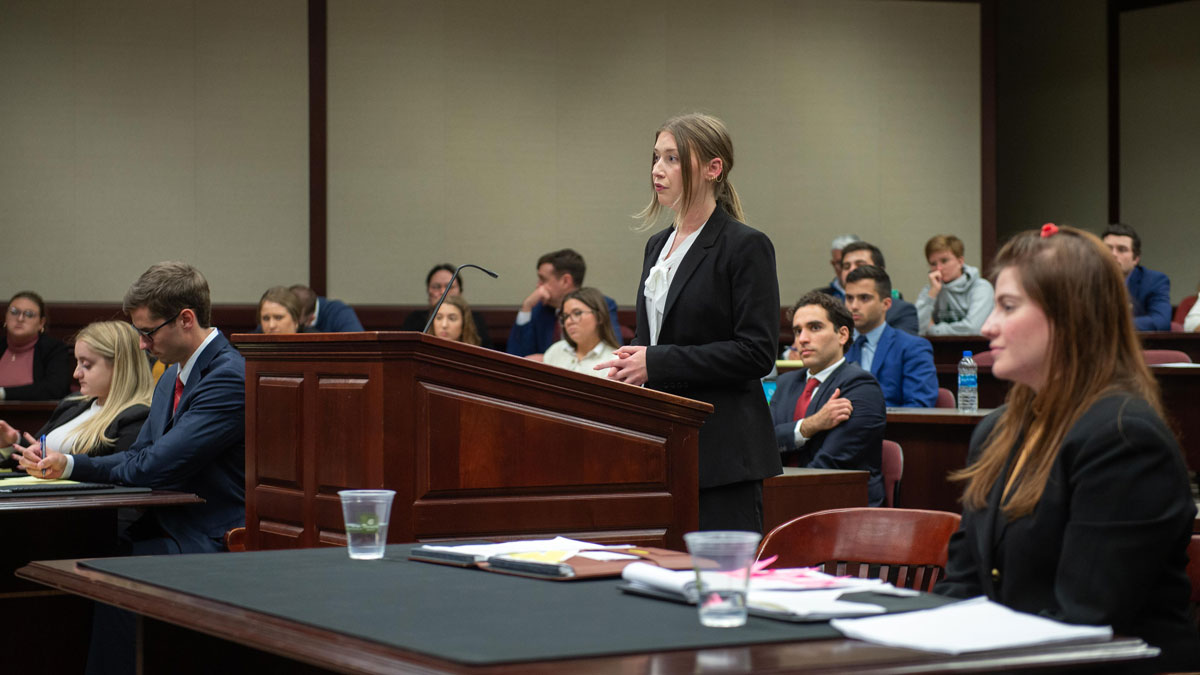
Making a point: A member of Texas Tech University School of Law’s health law moot court team advocates during the finals of the 2022 National Health Law Moot Court competition in the SIU School of Law courtroom. This year’s competition features 26 teams from 18 law schools Friday and Saturday, Nov. 3-4. (Photo provided)
November 01, 2023
SIU Law Health Law Moot Court examines IVF, bankruptcy dispute
CARBONDALE, Ill. — Law school students from around the country will compete this weekend as the Southern Illinois University School of Law hosts the National Health Law Moot Court competition, Friday and Saturday, Nov. 3-4, to argue a fictitious case before the U.S. Supreme Court on two distinct and complex issues of surreptitious in vitro fertilization and bankruptcy.
Twenty-six teams from 18 law schools will participate in the 32nd Health Law Moot Court competition —the only mock U.S. Supreme Court competition dedicated to the always evolving and expanding topic of health law.
The first issue involves a fertility doctor who, without informing a couple undergoing IVF treatments, mixed his own sperm with that of the intended father’s, conceiving the doctor’s biological child. Years later, after the man the child believed to be his biological father died, the child discovered his true parentage and is suing the doctor for severe emotional distress. The second issue involves the clinic where the doctor was employed; it has declared bankruptcy. The doctor who is being sued is seeking to have the bankruptcy court exercise jurisdiction over the child’s claim because of the doctor’s contractual right to be indemnified for any damage awards arising out of his work as a physician at the clinic, said Cheryl L. Anderson, law school professor and moot court programs director.
“There have been several similar cases involving doctors who surreptitiously substituted their own sperm without telling the individuals undergoing IVF treatments,” Anderson said. “Claims against those doctors commonly are brought by the mother and perhaps the intended father, but this case asks whether the child should also be able to hold the doctor accountable for the harm he inflicted.
“Many states have refused to recognize what they call ‘wrongful life’ claims, but the child here asserts his claim is not about whether he should have been born but the doctor’s actions in failing to inform his parents and prevent him from finding out under distressing circumstances.
“The bankruptcy context illustrates that no matter what type of legal claims may be at issue, attorneys need to be prepared to address the impact that bankruptcy procedures may have on their client’s ability to proceed.”
Teams will compete in the law school’s Hiram H. Lesar Law Building with preliminary rounds on Friday, Nov. 3. The final round will be available via livestream at 4 p.m. Saturday via the law school’s moot court board YouTube channel.
As the host, the SIU School of Law moot court team is not a competitor. Many alumni, faculty and friends of the law school will participate as early-round judges.
The final round judges are Judge Judy Cates, Illinois Fifth District Court of Appeals; Chief Judge Laura Grandy, U.S. Bankruptcy Court for the Southern District of Illinois; Dr. Eli N. Avila, president of the American College of Legal Medicine and distinguished visiting professor of public health, New York Medical College, Valhalla, New York, and Camille Davidson, dean, SIU School of Law.
Sponsors are the SIU School of Law, the American College of Legal Medicine (ACLM) and the American Health Law Association (AHLA).
For more information on the event and to arrange the best times for interviews on Saturday, Nov. 4, contact Cheryl L. Anderson, SIU School of Law professor, at 618-453-5634 or cheryla@siu.edu.
This year’s field includes defending and nine-time health law moot court champions South Texas College of Law Houston. Other participating law schools are Chicago-Kent College of Law; Loyola University Chicago School of Law; Indiana University Robert H. McKinney School of Law; Saint Louis University School of Law; Seton Hall University School of Law; Suffolk University School of Law; Texas A&M University School of Law; Texas Tech University School of Law; The George Washington University School of Law; University of California College of Law, San Francisco, formerly the Hastings College of Law; University of Houston Law Center; University of Minnesota Law School; University of Mississippi School of Law; University of New Hampshire Franklin Pierce School of Law; University of New Mexico School of Law; University of Oklahoma College of Law, and the University of Tulsa College of Law.
